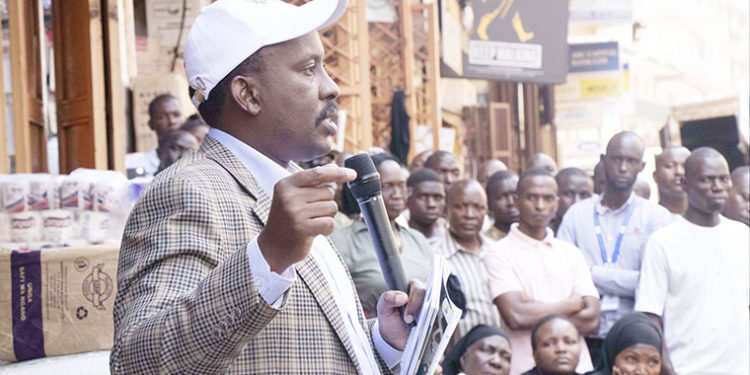By THE OBSERVER UG
Whereas the past few years have seemingly been a sail through for the Uganda Revenue Authority, with the revenue body hitting two of its last three targets, the last quarter of 2023 has been different.
In the 2022-2023 financial year, for example, the revenue body surpassed its annual revenue target by collecting over Shs 57.48 billion extra and posting a year-on-year growth of 16.4%. This financial year has, however, presented a different challenge as the projected annual collections seem to have hit a dead end.
In a report released by the ministry of Finance, it was indicated that the revenue performance as at December 18, 2023, URA had realized a domestic revenue shortfall of Shs 120 billion. This was after URA had collected domestic revenue of Shs 2.131 trillion against its expected revenue collections of Shs 2.251 trillion for November, 2023.
In yet another letter dated December 7, 2023, Ramathan Ggoobi, the permanent secretary of the ministry of Finance, summoned the top management of URA to explain why there was a shortfall in revenue collections for the month of October, 2023 amounting to Shs 600 billion.
In his letter, Ggoobi demanded administrative interventions aimed at addressing the current revenue deficits. This, among other things, highlights the pressure that has been exerted on the taxman to deliver annual revenue to the expected tunes. Uganda’s tax- to-GDP ratio, measuring the country’s tax revenue relative to the size of its economy as measured by its gross domestic product, remains among the lowest in Africa at a rate of 13.9%.
This, compared to other African countries whose tax-to-GDP ratio averages at 15.6%, indicates that Uganda is still performing below par. This explains the president’s clarion call to the revenue body during the 2023/2024 budgetary reading when he requested the taxman to emulate European countries like Netherlands that has a tax-to-GDP ratio of 39.7%.
It is crystal clear that with this pressure, the revenue body will be more aggressive in its collection of revenue in order to hit the several targets that have been set by the ministry, parliament and the president. In trying to attain the set targets, URA is likely to tighten the noose and ensure that the revenue shortfalls are curtailed. This will be done through numerous interventions.
In as much as the ministry of Finance suggested several administrative interventions aimed at addressing the revenue shortfalls, URA is likely to enhance its collection techniques to ensure that maximum tax is attained.
In the year 2024, therefore, medium and large taxpayers ought to prepare themselves for comprehensive audits of their businesses and thorough return examinations of their tax affairs as the taxman will most likely come at their doors knocking.
These audits may range from transfer pricing issues for multinational enterprises engaged in cross border transactions with related entities, income tax and VAT audits as well as customs post clearance audits spanning large periods of years.
Telecommunication companies are also likely to be subject of these audits. This follows the president’s comments aired last year when he castigated URA for failing to promptly tax companies like MTN and Airtel, among others.
The rental regime is also likely to become an area of interest for the taxman in the year 2024. Over the last five years, the law governing taxation of rental income has been overly changed. However, even with these changes, there has been consistently low revenue collected from rental income.
In this regard, taxpayers with rental premises ought to prepare themselves for administrative assessments relating to previously unpaid rental income as URA is likely to inspect any premises with tenants in order to charge rental tax.
Additionally, the use of EFRIS for VAT registered taxpayers will be enhanced. EFRIS is the electronic fiscal receipting and invoicing system introduced by URA and entails direct communication with business transaction systems to manage the issuance of e-invoices. Taxpayers that adamantly refuse to use the EFRIS system will likely be penalized for their failure to heed to the new system.
Beverage companies like Coca-Cola and Uganda Breweries Limited are also likely to be part of the taxman’s comprehensive audits. This will be done to ensure compliance with EFRIS invoicing requirements and usage of digital stamps on all products locally consumed in order to cover local excise duty.
The banking sector will not be left untouched. Assessments relating to nostro charges will increase. This follows URA’s success in courts of law where payments made by local banks for the management for carrying out of international transactions with foreign banks was equated to an international payment that attracts withholding tax.
An increase in the non-tax revenue can also be envisaged in the year 2024. Non-tax revenue includes government revenue that is not generated through taxes. A good example is money collected through traffic or road misuse penalties. Such revenue forms part of governments collections and is likely to increase.
In other words, taxpayers should prepare themselves for a tough 2024 with numerous interactions with URA as it tries to recover from the revenue shortfalls highlighted by ministry of Finance.
The writer is an advocate of the High court
{loadposition inarticle}







Discussion about this post